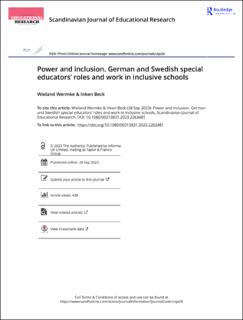Power and inclusion. German and Swedish special educators’ roles and work in inclusive schools
Peer reviewed, Journal article
Published version
Permanent lenke
https://hdl.handle.net/11250/3121409Utgivelsesdato
2023Metadata
Vis full innførselSamlinger
- Institutt for pedagogikk [285]
- Publikasjoner fra CRIStin [3623]
Originalversjon
Wermke, W., & Beck, I. Power and inclusion. German and Swedish special educators’ roles and work in inclusive schools. Scandinavian Journal of Educational Research, 1-13. https://doi.org/10.1080/00313831.2023.2263481Sammendrag
This article presents a comparative interview study (N = 45) with Swedish and German special educators working in inclusive school settings in order to gain an understanding of how inclusive education is operationalized by the provision of special education needs (SEN) support; and how both aspects are conditioned by nation-specific particularities. Drawing on our interview analyses, we suggest an analytical device for examining and comparing the provision of SEN support in school organizations from a comparative perspective. The device is a 9-dimensional matrix, understanding the phenomenon in terms of three levels (individual, group, organizational) related to three domains (educational, social, administrative). Employing this matrix, we explain national differences in operationalizing inclusive schools. Compared with Germany, in Sweden, special educators have much more power in the inclusive school, and significantly more important decisions regarding SEN are made at an organizational level, and not only regarding individual students in need of special support.

